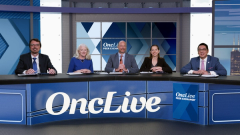
Factors in Selecting AR-Targeted Therapy for Patients With Metastatic HSPC
Expert perspectives on frontline AR-targeted therapy in metastatic hormone-sensitive prostate cancer, with deference to recent clinical trial data on triplet therapy.
Episodes in this series

Transcript:
Evan Y. Yu, MD: I'm going to ask you a question Mary-Ellen. I'm going to ask you the toughest one, which is there are a lot of options. We've talked about a bunch of them here. How do you decide between the options? Is it based on patient fitness, comorbidities? What are specific things that you are looking for that help you select between one agent versus another in this treatment situation?
Mary-Ellen Taplin, MD: Thank you, Evan. There are a lot of options. I have to say from the medical oncology perspective, spending a lot of time taking a good medical history than maybe I was doing when there were fewer options. Especially when I meet a new patient for the first time, I spend a detailed amount of time taking cardiovascular history, but also general medical health history. How much exercise? Are they able to walk up a hill? Have they had any falls in the last year or 2? How's their baseline respiratory status? Medical details like that because Those are the clues that help me choose which one of these drugs is best for that patient, for instance, if I have a patient who is elderly, relatively sedentary, had a fall 6 months ago. I might shy away from enzalutamide, but one of the other 3 choices apalutamide, darolutamide and abiraterone might be better for that particular patient. I'll put in the prescription and try to get the prior authorization and copay information based on that.
Evan Y. Yu, MD: What kind of patient do you worry more about with abiraterone potentially?
Mary-Ellen Taplin, MD: Two types of patients come to mind when I'm thinking about abiraterone. One of the adverse effects with is fluid retention. If I have someone with a compensated cardiac status, but maybe a history congestive heart failure that's on a couple medications, I would avoid abiraterone for that reason in a cardiac patient. Additionally, we use prednisone, a fairly low dose, 5 mg once a day or sometimes twice a day with abiraterone. As it's well known, those steroids can affect glucose tolerance. Someone with diabetes, or tending towards diabetes, that could tip a patient like that over into a diabetic problem I would avoid abiraterone and prednisone in those 2 types of patients.
Evan Y. Yu, MD: That's helpful. It's been discussed a little bit earlier, but we've talked about the idea of triplet therapy. There's obviously new data with that and that was brought up. I'm going to ask Pedro to summarize the new data from ARASENS and PEACE1 and what your thoughts are those studies and those agents.
Pedro C. Barata, MD, MSc: It's a relevant question. It's a hot topic. We can see it in different ways, if we were to do it historically, I guess. I would start with ENZAMET which we all are very excited because it was at the stage that one of the ASCO [American Society of Clinical Oncology] in. The question was opened about the addition of docetaxel in addition to ADT [androgen deprivation therapy] and hormonal therapy, in that case, enzalutamide. We saw that great dynamic; at the time we were skeptical because a lot of us were thinking that perhaps triplet therapy would make a lot of sense. At that time, nobody knew the concept of volume that came all the way from ARCHES to find as we said earlier, 4 more lesions were in the bone, and one outside the spine and pelvis, an official disease. Until we had that breakdown and it appeared that we didn't see a benefit of triplet therapy. We stayed on pause until more recently we saw data from PEACE1 and then ARASENS. First the PEACE1 is a mostly repeated study if you will about the Fizazi and others. The 4 core studies, large study asking 2 types of questions. Addition of abiraterone to standard of care, which of course change over time for more months to then incorporation of docetaxel. In a newer book that became a reality. The other question that we alluded here earlier has to do with radiation to the primary tumor. It's asking those kinds of questions and all we've seen is for the high volume population was that the study that clearly showed us that for high volume disease, it made sense to consider triplet therapy. Some would argue that patients who are fit for that new standard of care, ADT/docetaxel, considering abiraterone on top of it would be supported by level 1 activists based on PEACE1. When we saw remarkable RPFS, we talk about 2 years. In general, it changed the outcomes, benefiting patients who got treatment intensification. More recently we got ARASENS, which is also a Phase 3 trial that asks the question involving darolutamide in addition to, again, ADT/docetaxel, if you will. It's a triple combination, this time with anti-androgen. The difference is while don't have quite well the breakdown of how much patients we'd have with the disease on there. We'd conduct the analysis how Dr Smith alluded to; we predict that's a very high number of those patients. We have about 8% or so, 8 to 10s. We have patients who are considered fit for an ADT docetaxel. Using the same logic, we improve all the outcomes including overall survival. That again became a new standard of care, a new valued approach. How do we put all this together? In my clinic at least, I tend to believe that patients with high volume disease, especially those with de novo a metastatic disease, might benefit the most from that. Right now, some would argue that we might need still ADT hormonal therapies plus or minus docetaxel. Until then, I would argue that for a patient who comes to the clinic where we consider a combination of ADT docetaxel, considering a triple therapy is very, very well supported by the level 1 data available. I think that's where we are. There's more to come, there's other therapies being explored. We can talk about it certainly and we'll see how the molecular information's going to help us decide. I'm thinking for example Cascara exploring-0- deficient. Also, how the novel image is going to influence and impact how we treat patients and it's also going to challenge the concept of volume. Having said that, this is based on conventional scans, CT and bone scans. Obviously, we have emergence of novel imaging with PET scanning. The question is how we define volume that might be shaped by those concepts. This is an evolving field, but I think, in general, patients who tend to do worse would have poorer outcomes seem to benefit from treatment intensification approaches.
Transcript edited for clarity.










































